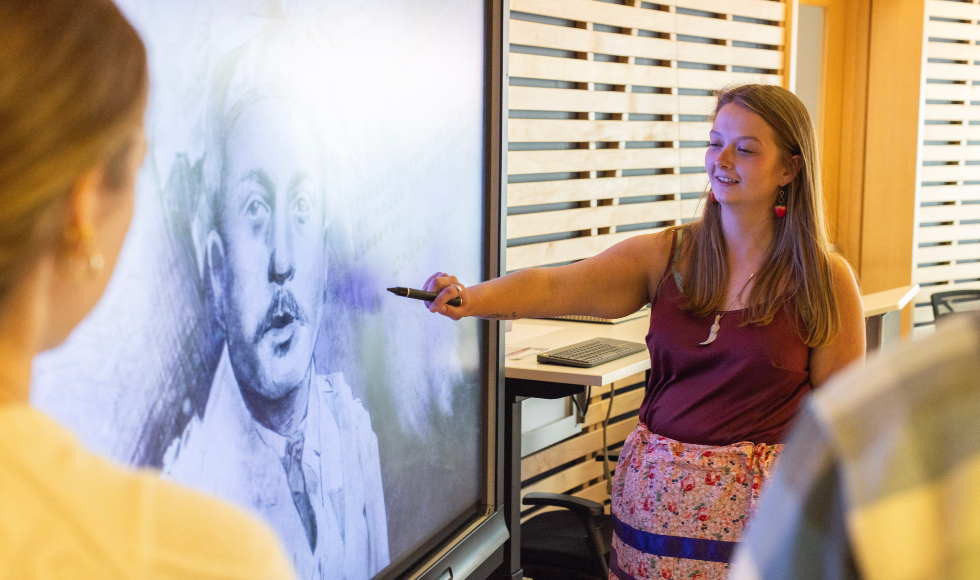Indigenous History Lab launches with new animated film ‘Deskaheh’

Tekenikhon Doreen points to a portrait of Deskaheh Levi General. Doreen created the new animated short 'Deskaheh' with professor and fellow director Allan Downey and producer Jersee Hill.
BY Sara Laux, Faculty of Humanities
December 3, 2024
In 2020, when history and Indigenous studies professor Allan Downey co-created Rotinonshón:ni Ironworkers, a six-minute animated short film, it was a departure from his usual academic work of researching and writing papers and books.
But the film, which Downey created with former student Carlee Loft, got attention: It won Best Animated Short at the American Indian Film Festival, was selected to appear at several international film festivals, was featured at the Smithsonian National Museum of the American Indian and appeared on Alaskan Airlines flights from 2021 to 2022.
And that got Downey, who is Dakelh (Nak’azdli Whut’en, Lusilyoo Clan), thinking.
“From that experience, I realized that I’d really enjoyed the mentorship aspect of the project, and the process of creating film out of historical research,” he explains.
“So I decided to establish a formal initiative that would allow us to keep doing that — to show Indigenous youth that our Indigenous histories deserve a stage. They deserve to be told in big ways, to big audiences.”
The result was Resurgent Histories: The Indigenous History Lab at McMaster University, a hub that will connect Indigenous youth with scholars, artists and filmmakers to bring Indigenous history to life through animated films.
The lab launches this week with a new short film, Deskaheh, which tells the story of Deskaheh Levi General, who travelled from Six Nations of the Grand River to Geneva in the early 1920s with the goal of advocating for Haudenosaunee sovereignty at the League of Nations after Canada’s Department of Indian Affairs imposed repressive policies on Six Nations and other Indigenous communities.
With his efforts suppressed by Canada and Great Britain, Deskaheh didn’t address the League of Nations or achieve widespread international recognition of Haudenosaunee sovereignty.
But a century later, his legacy endures. In 2023, a 20-member delegation from Six Nations travelled to Geneva to mark the anniversary and address the UN’s 16th session of the Expert Mechanism on the Rights of Indigenous Peoples.
Deskaheh was created with three Indigenous McMaster students: Narrator and co-director Tekenikhon Doreen; co-director Jersee Hill; and producer Kira Gibson. The film was animated by Vancouver-based artist Saki Murotani, who also animated Rotinonshón:ni Ironworkers.
“Being a part of this project has been a special learning opportunity for me in multiple ways,” says Hill, who is Mohawk, Turtle Clan, from Six Nations of the Grand River and a student in the department of Psychology, Behaviour and Neuroscience.
“Although I was a bit hesitant at first because I had never done something like this before, it has proven to be a unique learning experience that I don’t think I would have had elsewhere.”
In addition to the critical support network formed by the departments of Indigenous Studies and History, Downey lists professors Rick Montour from the department of English and Cultural Studies and Bonnie Freeman from Social Work as key partners; as well as artists, researchers, Knowledge holders, sound technicians, musicians and other members of Six Nations communities.
Juno Award-nominated musician Logan Staats, also from Six Nations, allowed the animation team to use his music as part of the film’s score, as did the celebrated Six Nations Women Singers.
The film, which has now been submitted to different film festivals, will be screened at McMaster on Dec. 5 in the L.R. Wilson Concert Hall from 12 p.m. to 2 p.m., followed by a discussion with the filmmakers.
For Doreen, who is Kanyen’kehá:ka, Wakhskaré:wake (Bear Clan) from Kente:ke (Tyendinaga Mohawk Territory), seeing the completed film for the first time was “a surreal experience.”
“Watching the story, all our hard work, the smallest details discussed to be drawn out, implemented and brought to life in such a big way was better than I ever imagined,” she says.
“I hope Deskaheh impacts everyone, not just Indigenous peoples, and paves the way for the resurgence of Indigenous histories, stories and truths to be told in an accessible and inclusive format that nurtures oral traditions of storytelling and making space for future animations to be created.”
To attend the free screening of Deskaheh on Dec. 5, please register on the Eventbrite website.


